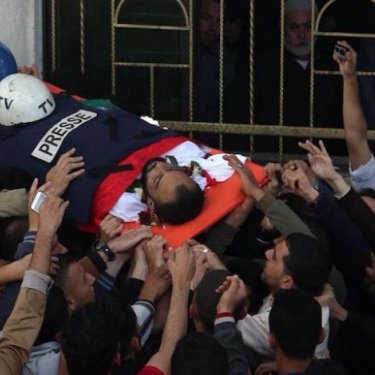Israel-Palestine : Four years of violence against Palestinian journalists covering “March of Return” protests

On the fourth anniversary of Palestinian journalist Ahmed Abu Hussein’s death from the Israeli sniper bullet that fatally wounded him as he covered one of the “Great March of Return” protests near the Israeli border in the Gaza Strip, Reporters Without Borders (RSF) announces that it has registered more than 140 Israeli violations against Palestinian journalists since these weekly protests began in March 2018.
Hussein died in hospital on 25 April 2018 from the gunshot injury he sustained while covering the protest on 13 April. Another Palestinian journalist, Yasser Mortaja, was killed on the spot by an Israeli military sniper’s bullet while covering the protest on 6 April 2018.
The weekly protests were launched on 30 March 2018 to denounce the Israeli blockade of the Gaza Strip and to demand the “right of return” of Palestinian refugees. The protests have been held every Friday since then in the Gaza Strip, and even in the West Bank, and have been systematically covered by reporters on the ground.
According to an RSF tally, at least 144 Palestinian journalists have been at the receiving end of live rounds, rubber bullets, stun grenades or teargas fired by Israeli soldiers or police – or their baton blows – in the Gaza Strip, the West Bank and East Jerusalem during the past four years of “Great March of Return” protests.
Those badly injured include Youssef al-Kronz, a freelance photographer who was hit in both legs by shots fired by Israeli soldiers during the first protest on 30 March 2018 and had to undergo partial amputation of his left leg.
Two journalists were totally or partially blinded in one eye. One was Yahya Khalid, a journalist with the Palestine Today News agency, whose left eye was injured by bullet fragments on 19 October 2018. The other was Al-Aqsa TV’s Sami Misran, who was blinded in his left eye by a bullet fragment on 13 July 2019.
Ali Jadallah, a reporter for the Turkish news agency Anadolu, sustained a serious head injury when hit by a rubber bullet on 30 August 2019. It was the third time he had been targeted since the start of the protests.
“Palestinian journalists are still taking serious risks after four years of tirelessly covering the Great March of Return demonstrations every Friday,” said Sabrina Bennoui, the head of RSF’s Middle East desk. “These reporters find themselves caught up in the repressive measures used by the security forces against the protesters, and are sometimes injured, often deliberately, when they are just going their job to cover events.”
In May 2018, after the two deaths and many injuries, RSF asked the International Criminal Court to investigate what it regarded as war crimes against Palestinian journalists covering protests. In March 2021, then ICC Prosecutor Fatou Bensouda announced that there were sufficient grounds for initiating an official investigation. But nothing has been announced since then.
Aside from the physical violence by Israeli soldiers and police during the Friday protests, RSF has also noted two surges in violence against Palestinian journalists: during the military offensive in the Gaza Strip in May 2021 following the expulsion of Palestinian residents in Sheikh Jarrah (East Jerusalem), and the current tension linked to the month of Ramadan and the clashes on the Temple Mount in East Jerusalem.
Israel is ranked 86th out of 180 countries in RSF's World Press Freedom Index, while Palestine is ranked 132nd.
